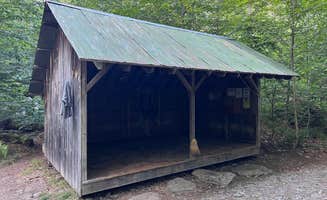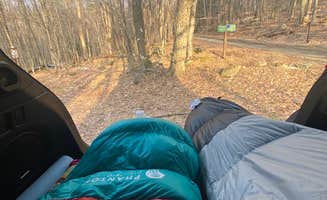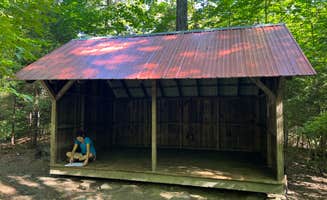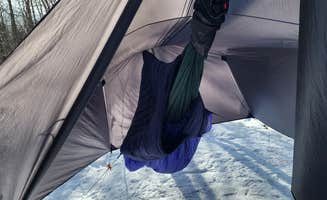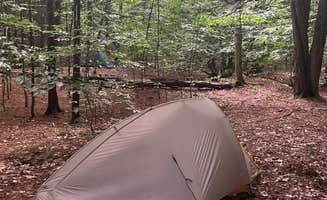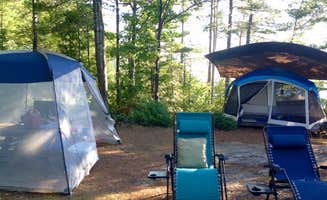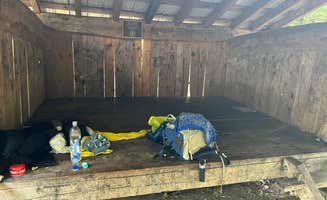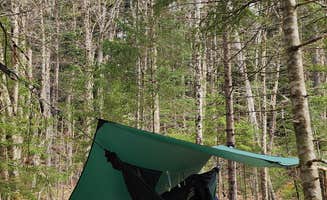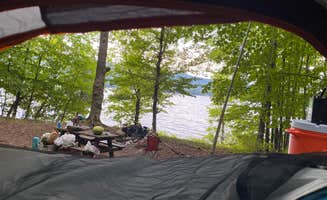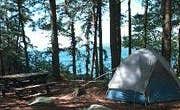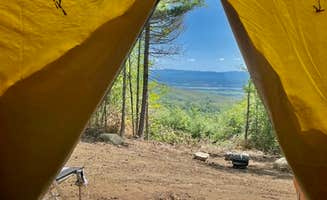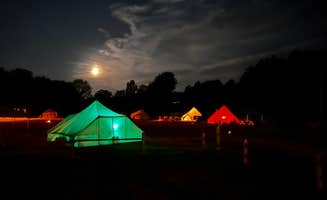Tent camping near Cuttingsville, Vermont offers access to Green Mountain National Forest with established wilderness shelters and primitive sites. The region sits at approximately 1,200 feet elevation with temperatures ranging 45-75°F during camping season. Forest service access roads typically open mid-May, with some routes requiring high-clearance vehicles due to spring runoff conditions and minimal maintenance.
What to do
Swimming options: The Stratton Pond area features one of the largest bodies of water on the Long Trail. According to a winter camper, "the lake looks great and is one of the largest bodies of water on the Long Trail" with tent platforms and bunk spaces available at the Stratton Pond Shelter.
Hiking connections: Thistle Hill Shelter provides direct trail access without requiring transportation to trailheads. A hiker described it as "a peaceful place to stop in the woods" with "smaller spots for tent camping that were somewhat sloped" making it suitable for solo travelers seeking connection to trail systems rather than basecamp amenities.
Fishing opportunities: Michigan Brook Road camping areas provide direct creek access for anglers. A camper noted there are "nice little spots to hangout all day. Lots to see, and explore" at Michigan Brook with several established sites located near fishing spots along the water.
What campers like
Waterfront locations: Last Light on Michigan Brook offers premium streamside camping for tent campers. One visitor described it as "Love this site! The very last spot on the right hand side. If you've reached the closed gate you've missed the site!" which highlights its somewhat hidden nature and proximity to water features.
Privacy levels: Stony Brook Shelter provides secluded spots away from main camping areas. A reviewer mentioned "there were a few large tent areas where multiple tents could fit and which looked quite level" and noted "large tenting areas" with "decent privacy" at Stony Brook Backcountry Shelter.
Wildlife viewing: Bingo camping area provides opportunities to observe woodland wildlife in natural settings. One camper simply noted the "beautiful stream close by" making it ideal for watching local wildlife that frequents water sources during early morning and evening hours.
What you should know
Water availability: Michigan Brook Road camping requires water planning as sources are seasonal. A winter visitor warned, "PLEASE NOTE: THIS LOCATION DOES NOT PROVIDE CELL PHONE SERVICE OR WIFI CONNECTION" but mentioned "if you walk to the end of upper Michigan Brook road you will have cell phone service and a gas station along with a United States Post Office as well as a general store."
Road conditions: Several Michigan Road camping areas have challenging access depending on season and vehicle type. A camper specifically cautioned that "Road goes in pretty far. Some parts are muddy and very rough. Higher clearance would be advised!!!" at Michigan Road camping areas.
Seasonal closures: Winter access to most dispersed camping is limited or prohibited. One visitor reported simply "Road has been closed" during spring conditions, while another winter camper noted "if you would like to continue down the service road during winter months I would highly recommend snowshoes or a snowmobile."
Tips for camping with families
Swimming opportunities: Stony Brook offers family-friendly water features accessible from camping areas. A reviewer mentioned finding "a decent swimming hole (could just barely submerge myself) to clean off a bit" after exploring "a bit offtrail down the brook."
Shelter options: Winturri Shelter provides flexibility for mixed tent and shelter camping. A visitor described it as having a "shelter on the larger side and could fit maybe 6-8 folks" with "lots of tent camping spots as you worked up the hill perpendicular to the shelter" at Winturri Backcountry Shelter.
Safety features: Several backcountry shelters offer bear boxes not common to all wilderness sites. One camper specifically noted "There was also a bear box here, which I hadn't seen at other shelters along the AT in Vermont" which provides added security for family food storage.
Tips from RVers
Access limitations: Michigan Brook Road becomes progressively challenging for larger vehicles. A camper experienced firsthand that "I attempted to bring my car and was stuck overnight but was able to dig myself out the next morning" during winter conditions, suggesting even moderate-sized vehicles face challenges on these roads.
Supply planning: RVers should stock supplies before arrival as nearby services are limited. The Last Light on Michigan Brook location received the simple but important reminder from a regular visitor: "Keep it clean!" as pack-in, pack-out principles apply with no services or trash removal available at remote sites.
Turning space: Forest access roads often lack adequate turnaround areas for larger vehicles. Campers report that Michigan Road areas have limited space for maneuvering vehicles once you've passed certain points, with one camper recommending to "Drive in about a mile after the parking lot!! Can use car to get in! There's 3 camping spots."


